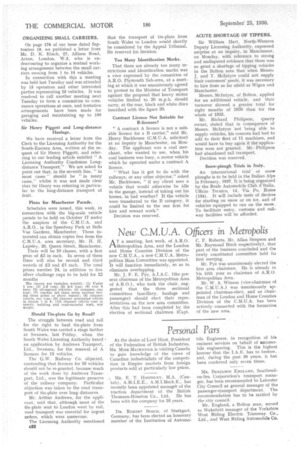ORGANIZING SMALL CARRIERS.
Page 68

If you've noticed an error in this article please click here to report it so we can fix it.
On page 176 of our issue dated September 18, we published a letter from Mr. D. K. Kinch, 27, Allison Road, Acton, London, W.3, who is endeavouring to organize a mutual working arrangement between the small carriers owning from 1 to 10 vehicles.
In connection with this a meeting was held last Tuesday and was attended by 15 operators and other interested parties representing 25 vehicles. It was resolved to call another meeting next Tuesday to form a committee to commence operations at once, and tentative arrangements have been made for garaging and maintaining up to 100 vehicles.
Sir Henry Piggott and Long-distance Haulage.
We have received a letter from the Clerk to the Licensing Authority for the South-Eastern Area, written at the request of Sir Henry Piggott, and referring to our leading article entitled "A Licensing Authority Condemns Longdistance Transport." We are asked to point out that, in the seventh line, "in most cases" should be "in many cases," whilst it was not made clear that Sir Henry was referring in particular to the long-distance transport of fruit.
Plans for Manchester Parade.
Schedules were issued, this week, in connection with the big-scale vehicle parade to be held on October 17 under the auspices of the C.M.U.A. and A.R.O., in the' Speedway Park at Belle Vue Gardens, Manchester. Those interested can obtain copies free from the C.M.U.A. area secretary, Mr. H. H. Lapsley, 28, Queen Street, Manchester.
There will be 10 classes, with a first prize of £3 in each. In seven of them there will also be second and third awards of £2 and El each. The total prizes number 24, in addition to five silver challenge cups to be held for 12 months
The classes are (unladen weight): (1) Under 1 ton; (2) 1-2 ions; (3) 2-4 tons; (4) over 4 tons; (5) oil-engined Tehicles; (6) steamers, any type: (7) coaches (all these seven sections having three prizes as above stated); (8) cleanest vehicle, soy type; (9) cleanest nominated vehicle in classes 1 to 4; (10) cleanest vehicle used in quarry. building and read-material work, any weight.
Should Tin-plate Go by Road?
The struggle between road and rail for the right to haul tin-plate from South Wales was carried a stage farther at Swansea, last Friday, when the South Wales Licensing Authority heard • an application by Andrews Transport, Ltd., Swansea, for the renewal of A • licences for 18 vehicles.
The G.W. Railway Co. objected, contending that licences for 18 vehicles should not be re-granted, because much of the work done by Andrews Transport, Ltd., was the legitimate preserve of the railway company. Particular objection was taken to the road transport of tin-plate over long distances.
Mr. Arthur Andrews, for the applicant, said that, although most of the tin-plate sent to London went by rail, road transport was eSsential for urgent orders, which were numerous;
The Licensing Authority mentioned that the transport of tin-plate from South Wales to London would shortly be considered by the Appeal Tribunal. He reserved his decision.
Too Many Identification Marks.
That there are already too many restrictions and identification marks was a view expressed by the committee of A.R.O. Plymouth Sub-area, at a meeting at which it was unanimously agreed to protest to the Minister of Transport against the proposal that heavy motor vehicles limited to 20 m.p.h. should carry, at the rear, black and white discs inscribed with the figure 20.
Contract Licence Not Suitable for B-licensee?
"A contract A licence is not a suitable licence for a B carrier," said Mr. , Henry Backhouse (C.M.U.A. solicitor) at an inquiry in Manchester, on Monday. The applicant was a coal merchant, who wanted to use, when his coal business was busy, a motor vehicle which he operated under a contract A licence.
" What has it got to do with the railways, or any other objector," asked Mr. Backhouse, "if my client uses a vehicle that woukl otherwise be idle in the garage, instead of taking out his horses, in bad weather? If the vehicle were transferred to the B category, it could be limited to the one firm for hire and reward work."
Decision was reserved. ACUTE SHORTAGE OF TIPPERS.
Sir William Hart, North-Western Deputy Licensing Authority, expressed surprise at an inquiry, in Manchester, on Monday, with reference to strong and undisputed evidence that there was so great a shortage of tipping vehicles in the Bolton area that when Messrs. J, and T. McIntyre could not supply their customers' peeds, it was necessary to hire from as far afield as Wigan and Manchester.
Messrs. McIntyre, of Bolton, applied for an additional vehicle, and their turnover showed a greater total for eight months of 1936 than for the whole of 1935.
Mr. Richard Philipson, quarry owner, stated that in consequence of Messrs. McIntyre not being able to supply vehicles, his concern had had to add to their fleet of 11 machines, and would have to buy again if the-application were not granted. Mr. Philipson had abandoned rail transport.
Decision was reserved.
Snow-plough Trials in Italy.
An international trial of snow ploughs is to be held in the Italian Alps in February, 1937, It is being organized by the Reale Automobile Club d'Italia, Ufficio Tecnico, 14, Via Po, Roma (134). It will include tests of devices for starting on snow or on ice, and of vehicles equipped to run on the snow. To facilitate entry, customs and railway facilities will be afforded.
























































































































































